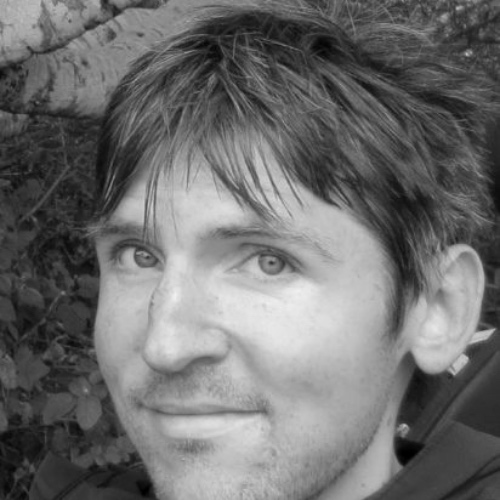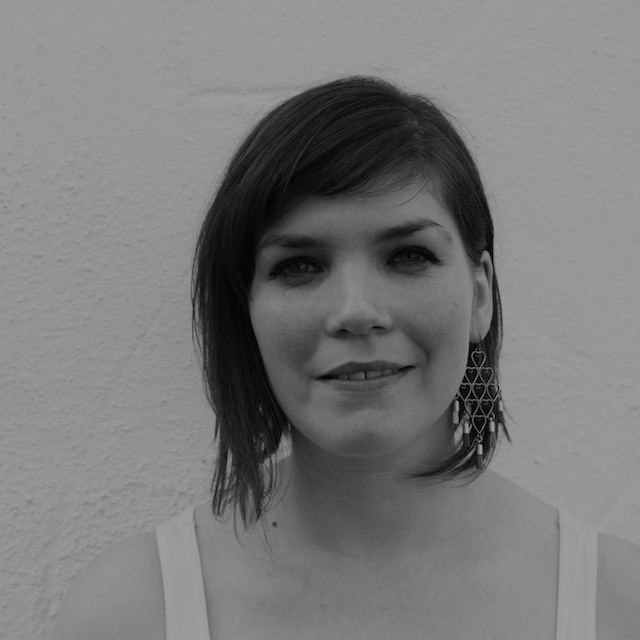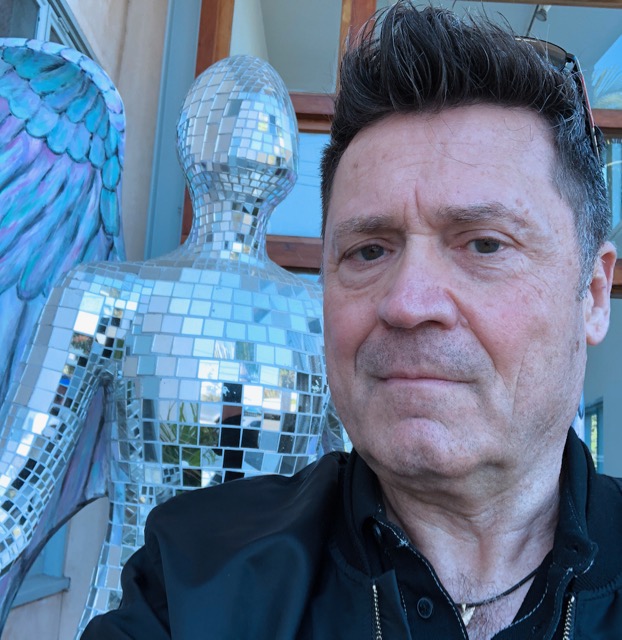“Why do all the kids in these paintings look like old men?” Sabine asked, inspecting the legacy of some long-dead Italian.
I tilted my head back to drum up a few extra millimeters of breath, placating my air hunger for another minute or two, and replied, “I think those kids are supposed to be Jesus.”
“And why, exactly, does the baby Jesus have your dad’s hairline?”
I shrugged. “The immaculate recession?”
She rolled her eyes, but didn’t say a word. She couldn’t. It was my birthday. My fortieth, in fact. A day I had never expected to see.
In honor of the occasion, we’d left home for a trip down the coast in our wheelchair-accessible minivan, putting our faith in the traffic gods to deliver us through the San Fernando Valley and into the rolling hills of the Santa Monica Mountains without a blood sacrifice—though, as anyone who has ever served time bumper-to-bumper in Los Angeles might, we would’ve considered it.
Our destination: the Getty Center—a haughty fortress of travertine and glass that dominated a ridge of the aforementioned mountains, offering views without to rival those of the art within. Promises of French Impressionism had drawn us forth, driving us through the endless rooms of Renaissance religious artwork that the late oilman J. Paul Getty preferred—including, of course, prematurely aged baby Jesi.
“There’s a name for those little dudes, but I can’t remember it,” I said, nodding at another one of the proportional dwarves as we headed for the nearby exit. “They used to be all over the place in the Middle Ages.”
“Why? Was there a plague that made everybody forget what babies looked like or something?”
I exhaled something approximating a laugh. “No. Jesus was supposed to be a perfect being, so he couldn’t come out all needy and naïve. He had to be wise beyond his years from the start. He had to be perfect.”
“Yeah. Perfectly creepy.”
She opened the door for me, and we plunged into the searing sunlight of outside, exiting one of four spare, angular buildings in favor of an equally spare central courtyard clad in porous limestone. The courtyard, liberated from the surrounding urban sprawl, spanned the visible world, creating an interstitial purgatory less Hieronymus Bosch than Michelangelo Antonioni: sterile and lonely and vast.
No matter how much it may have looked like one, however, this place was no afterlife. In the afterlife, one likely didn’t struggle for breath, as I was at the moment. The schnitzel and stuffed grape leaves from the Israeli place we’d stopped for lunch bloated in my guts, shattering the illusion of inviolability as it squeezed the vigor of all creation from my scarred and atrophied diaphragm.
This wasn’t a new phenomenon for me. Once upon a time, I could breathe on my own. All the time. As my Duchenne muscular dystrophy progressed, however, I required ventilatory support overnight. And then during the day for a few hours. And then a few more. And so on, until my current schedule of three additional hours, three times a day.
But I was also a stubborn American, programmed for rugged individualism, suppressed emotions, and a hatred for all weakness. So I only ventilated in private. Beyond the relative obscurity of my home or minivan, I took my chances with hypercapnia and its mostly tolerable symptoms of headache, fatigue, and muddled thoughts.
From the outside, such masochism must seem baffling. Why would I, crumpled and cachexic novelty to all, care how I presented myself to other people? It would be like water worrying about its perceived wetness. More likely, I was trying to convince myself of something. That I wasn’t getting worse. That I wasn’t going to die. That, somewhere deep inside, I was still the same little blue-eyed boy who had walked the black sand beaches of Hawaii and fished the alpine lakes of the Sierra Nevada for the briefest of moments and taken it all for granted.
I never understood society’s aversion to taking things for granted. There’s no contentment in it. Better to pretend the status quo will last forever as long as you possibly can. Right up until the point you leave your ventilator in the car on the far side of a three-quarter mile tram ride and find that you desperately need it.
Sabine, looking as exhausted as I felt, collapsed onto a short wall for a quick rest and social media update. As she flicked through her phone, I glanced past her. The land fell away on the other side of the wall, revealing a terraced garden and then the entirety of the sprawl—a mosaic of well-organized cubes and haphazard garnish that paved nearly all the eye could see.
The toothy buildings of Century City rose in the medium distance, with the grasping skyscrapers of downtown well beyond. At the edge of perception drifted a hazy suggestion of the gossamer Pacific, remote to the point of obscurity, yet so much closer than the tsunami of revitalizing tidal lung volume that awaited me on the back seat of the van. I felt as stupid as I did inadequate for leaving the ventilator behind, but I wasn’t about to abandon the Getty because of it. Not until I saw me a Van Gogh.
Sabine snapped her fingers. “Homunculus,” she said, glancing up from her phone with a satisfied grin.
“Gesundheit,” I replied, forcing another breath and bracing against a world increasingly bled of color and sharpness.
“No, you dork. That’s what they call the weird Jesuses. It means ‘little man.'”
As she spoke, my eyes locked on a kid in a wheelchair with obvious Duchenne crossing the courtyard not far away. Check that. Two kids. One on either side of puberty. Brothers, no doubt. Puffy-faced and puffy-limbed like I had been at their age, before I emaciated into my current form–now more Charles Schultz than Peter Paul Rubens.
“Poor bastards,” I said.
“Who? The Jesuses?”
I nodded. “Everyone deserves a childhood. Martyrs most of all.”
The boys, surprisingly flanked by both parents, turned in our direction, and I fought the urge to hide, to spare them a glimpse at the specter of their future. I knew the life these two would lead, or at least the path that their debilitation would take, robbing them of everything they once were and could have been and replacing it with a terrified cesspit of traumas and regrets.
Growing up, I’d witnessed my destiny every three months in the silent, skeletal sentinels of the child muscle clinic. Now that I’d become that destiny, I felt only pity for my younger self. For these boys. I had become my fear. And theirs.
Sabine squeezed my forearm. “You okay?”
“Yeah. Just getting old.”
“Me too.”
The boys drew nearer. Unable to escape any other way, I closed my eyes. If I couldn’t see them, maybe their passing wouldn’t be so bad.
“Forty years,” I said, shaking my head. “You know they stop keeping track of mortality rates for Duchenne at age twenty-four? Half of us are already dead by then, so I guess it’s not worth the hassle.”
She squeezed my arm harder. “But you’re not dead.”
“I know. And I feel guilty every day because of it.”
“Guilty? Why?”
“Like I said, half of us are gone by twenty-four. I’m forty. What have I done with all that extra time?”
“You found me.”
I opened my eyes. The boys were gone. Their parents too. But not Sabine.
“Yeah. I found you. A beautiful, able-bodied woman to love me and take care of me. I’m a god damn unicorn.”
She snorted, then stood up. “Come with me, Mr. Unicorn. There should be some Wheatstacks for you to eat in the West Pavilion.”
***
We headed into the appropriate building and blew through the first few rooms like in that old Godard movie, chasing the brass plaques as they ascended chronologically toward the mid-nineteenth century; there wasn’t enough time to see everything and I didn’t want to miss the good stuff. Story of my life.
I blame whoever first decided we should all live every day like it was our last. Carpe diem and all that. So much pressure. So exhausting. If I lived a single day like it were my last, I’d be too tired to leave the house for a week.
A sudden crowd announced the arrival of the Impressionism gallery. I skirted a slow-walker and darted through the congested opening, nearly colliding with one of the Duchenne boys making his way out. He didn’t look at me, and I returned the favor. We passed each other like those clichéd ships in the night. Two Titanics—one still chugging to New York, and the other already at the bottom of the sea.
His older brother followed, nearer the iceberg but not yet sinking, and I decided those of us with Duchenne needed a secret wave, like bikers sharing some dilapidated highway, though most of us couldn’t raise our hands anymore. Maybe a secret head wiggle would do.
There were barely 10,000 of us in the whole country, we brothers (and the rare sister) in disease. Why estrange ourselves from each other?
Inspiration struck me as I slipped past the second boy and I whispered, “What’s up, my brother?”
He either ignored me or didn’t hear, but his trailing mother must’ve seen my lips move because she smiled and mumbled a greeting. She knew what I was. So did the dad. I was a seer, and the news was all bad. Still, they had to be nice to me. If they were, it meant their own children might still know kindness in their debilitated future.
I had parents too–long-since divorced, but both still living—yet these boys and I were the three of us orphans, for muscular dystrophy is an orphan disease. It’s not common enough for a cure or treatment to be economically viable, so there isn’t one. In short, we’re not worth the effort. If only we had AIDS instead, our hope for the future might be something more than mere delusion.
We were literal orphans as well, despite our living parents. Like Mowgli or Tarzan, we’d all been raised by a species alien to our own. For no matter the love these Homo sapiens showed us, they’d never understand our kind completely—we, the Homo dystrophus. With our difference in lifespan, in presentation, in social interactivity, we were demonstrably “other,” and perhaps even deserving of our marginalization—like Neanderthal man, consumed by the fitter species until we were but broken threads in a wider tapestry. Ain’t internalized ableism grand?
Another breath and I was beyond the so-called family, deposited into the heart of the crowded gallery. I found an opening and cut right, stopping in front of one of several works by Claude Monet.
After a moment, Sabine appeared at my side. “Why are you looking at that one when the birth of Impressionism is right next to it?” she asked, motioning at a sunrise view of Le Havre painted in 1873.
But my eyes were locked on The Portal of Rouen Cathedral in Morning Light, done twenty years later. I stared at the puffy, drab brushstrokes and wondered how many of the abbreviated, messy things streaked across the canvas. 10,000, perhaps? Discrete, yet all bound to the same repetitious, atrophied palette, and all working together to create the pale imitation of something holy to our pattern seeking brains.
I whispered the name to myself. Ruin. That was me—a ruin of my former self. A stained heap of marble going through the motions until I toppled into obscurity. Or perhaps it was pronounced “rue on.” Either would do for my purposes.
When I looked away from the painting, Sabine had moved across the gallery to check out Van Gogh’s Irises. As I turned to follow, the floor beneath me wobbled. No, not the floor. It was me.
I gasped for a breath that didn’t want to come. Sabine was too far away. There were people everywhere. Talking, walking, obstructing. The only opening was out, so I took it, veering through a doorway and into the elevator atrium.
The family was there. The mom saw me and smiled again.
“How old are you?” she asked.
The dad jabbed at the elevator button, keeping his eyes locked on a nearby gift kiosk.
“Forty,” I managed. “Today.”
“Congratulations.”
I didn’t know what to say, so I said nothing. The world swayed beneath me. Stars wriggled across the room.
“It’s nice to see you out,” she said. “They won’t say anything, but I know the boys appreciate it.”
I glanced at the nearer boy. The older one. He winced, then stared at the top of his pudgy knees.
“Why?” I said, face flushed and heart thumping.
“You give them hope,” she said. She reached for my shoulder, then thought better of it. “Forty years old and you don’t even need a ventilator.”
My diaphragm forced an involuntary heave. What little color remained drained from the world. My vision tunneled. Air hunger crushed my spine behind my distended guts.
But I smiled anyway.
Probably best to keep up appearances.
##



